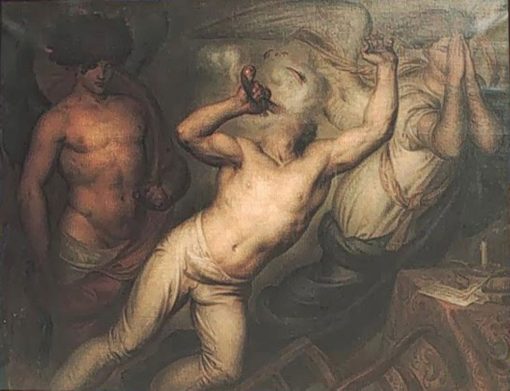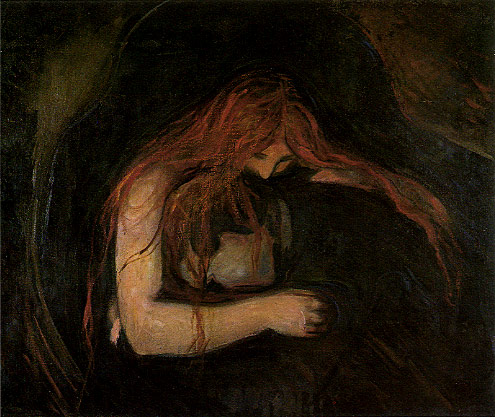
Critique without a concern for nobility becomes a form of cursing, both in the quotidian and in the occult sense.
*
The self-made men of archaic times were the ones who defied the fates laid out for them in the stars.
*
When we feel ourselves oppressed, we are more tempted to imitate the vices of our oppressors, rather than their virtues.
*
Tic of a miserly intellect. —Whenever one wishes to write about the many while at the same time preventing the reader from gaining a higher and loftier standpoint, one uses the passive voice. It is a way of speaking of foolishness and delusion without piercing through them to uncover the forces they conceal.
*
“One swallows the identity of victim out of the hope that doing so will enable one to vomit up the fruit from the tree of the knowledge of good and evil.”
Unless we find ourselves at war or are embroiled in some other situation where our lives are under constant and immediate threat, we will never feel ourselves worthy of the idea of goodness we have chosen to honor. So when we find ourselves released from the brutal necessity of having to struggle for our lives, we begin to toy with the idea of allowing ourselves to be injured as a way of proving our fidelity to the sweetest of our moral ideals. The most appropriate way to appease this cloying and impressionable tyrant, we become convinced, is to sacrifice to it our instincts to protect ourselves from suffering and harm. But in pressing its demand on us to renounce what we take to be vital to our well-being and to our interests, the ideal allows itself to be tested as much as it tests those who revere it. For it is by throwing the idol onto the pyre that we are able at last to feel the value of its value.
*
Many a materialistic philosophy posits a point at which thought and desire will no longer be necessary, where they will give way to the sensation of complete fulfillment. Such a supreme degree of fulfillment is something they deduce from the ordinary physiological operations of filling one’s stomach, emptying one’s testes, or voiding one’s bowels. It cannot imagine any role for the intellect other than that of a valet assigned to oversee the satisfaction of these physical needs, pressing the spirit into the service of the most mechanical activities of the flesh. Yet, even those with the most avowedly deterministic and utilitarian outlooks would never imagine selling their souls to fulfill their ambitions, since their dreams are simply more satisfying and more pleasant versions of these ordinary bodily functions. Instead, the Faustian bargain that the materialist finds impossible to resist is the one that demands of him to sell short the price of his soul. This he does gladly, as past performance would indicate a steep drop in its value. But this is the one transaction where he neglects to hedge his bets, and which invariably wipes out the hoard of patience and moderation that he has carefully saved up over the years in the pursuit of a modest goal that remains ever beyond his reach.
*
Sometimes when we catch sight of someone or something that we find beautiful, we find that our eyes do not linger on the object of our admiration but drift inexorably toward the spaces around it. It is as though the sight of what is stunning and unworldly leads us to intimate that there is something else that is present, a hidden force which is as yet concealed from our sight and which we ourselves lack the necessary splendor to grasp. One becomes driven to learn how to create beauty for the sake of developing the intuition for divining this element, this seed of the spirit, the cord that holds up the enchantment and gives light to its breath.
*
The aversion to judging others: not from a fear of being judged one’s self, but rather from the desire to see only by casting modest glances, maintaining that distance which alone preserves tenderness of feeling.
*
For the most conscientious and scrupulous, contempt is the emotion that takes the longest time to experience, since they take great pains to distinguish it from sour grapes.
*
One swallows the identity of victim out of the hope that doing so will enable one to vomit up the fruit from the tree of the knowledge of good and evil.
*
Liberals believe that their political opponents believe whatever they want to believe.
*
Those who despise authority can be brought to respect it only if they are able to convince themselves that it is evil. For the only thing that makes obedience palatable to them is the promise that they will not only be protected from the consequences of evil but can also have a share in its glamor.
*
The act of giving another hospitality, according to Deconstruction, derives from and depends on an ideal, pure, and unconditional form of hospitality in which one renounces all thought of reciprocity and places everything one possesses at the disposal of the guest. But actual instances of hospitality, being constrained by pragmatic concerns, will always fall short of a standard that Deconstruction regards as impossibly distant. Nor can the act of positing an ideal escape the question of who, or of what kind of person, would be capable of living up to its demands. In this case, it is not the saintly individual who sacrifices his life for the sake of others who is capable of offering a pure and unconditional form of hospitality. From the standpoint of the Deconstructionist, which he has inherited from Nietzsche, the saint is still demonstrating his power even as he gives up his own life. The fact that he hopes that those for the sake of whom he suffers and dies will achieve a higher moral and spiritual state, perhaps becoming saints themselves, violates their personal autonomy: for such a hope still issues a demand upon others, and accordingly constitutes an act of violence. By contrast, the individual who goes further than merely sacrificing himself is the one who is willing to be sacrificed by the guest, who is willing to have his moral and symbolic identity usurped and expended for the sake of purposes that he either opposes or cannot even conceive. Thus, from the standpoint of those who condemn the value of nobility and deny its possibility, the most morally admirable act is to permit oneself to be sacrificially murdered, even in vain, by the other. For it is more sublime to die in order to satisfy the evil desires of the other than his good desires.
*
Ideology is born out of the separation of instinct and mechanism. Belief in ideology can only take root once one has allowed mechanism to run on its own, having cut itself off from the warmth and energy of our senses and intuitions. The ideologue wants to turn the world into a puppet show, which is the closest he can come to imagining the souls of others.
*
Dead ideas and discredited ideologies have an afterlife of serving as spiritual narcotics when reality becomes too awful and too bewildering to contemplate.
*
To accuse another of being violent or cruel can be a way of forcing him into an impossible situation—if he reacts with anger, then he proves that the accusation is true. If he responds with gentility or shows restraint, he arouses the contempt of the accuser, who comes away gratified by what he regards as the other’s display of weakness. Either way, the accuser feels that he has gained the advantage over the one he accuses. For as much as the weak person condemns strength, he despises weakness all the more, and will devote all the resources of his cunning to detect and expose the vulnerability of those whom he envies. The most effective recourse one has in such situations is to be artful about one’s patience—one must not give vent to one’s frustration, lest one fall into the trap, but rather make a display of one’s reserve.
*
The advantage of decadent times. —For those in whom the desires to serve and to admire are inordinately strong, their sense of judgment becomes clouded and their mind easily falls asleep at the suggestion that they have committed themselves to their duties without having glimpsed the whole of reality. Their devotion to their obligations dissuades them from contemplating whether the objects of their labors are in fact worthy of their talents and gifts. To wake them from the spell cast by their scrupulousness is no easy task, since it is what they sense is best in themselves that keeps their eyes fixed on a narrow and limited horizon which extends no further than their conception of duty. Only a crushing disappointment has the power to force them to recognize that there are values higher than the community or the common good, or to bring them to the love of something greater than the limited objects of their present service and admiration. Just as we must overcome our faults and vices in order to become noble, it is also necessary periodically to cure ourselves of our virtues, especially when they have become relics in the eyes of others, who nevertheless are not above manipulating them as talismans so that they may use our second-highest aspirations against us. So then, let us climb to still higher ground, the paths to which our disillusionment has opened up for us!

